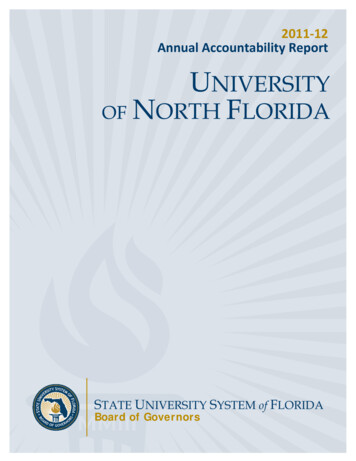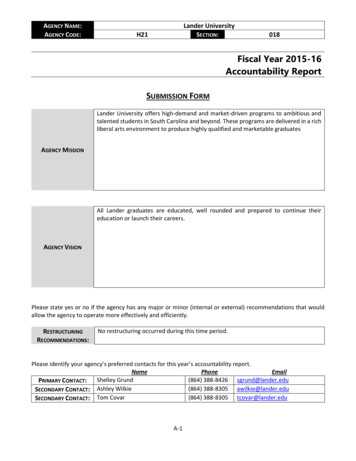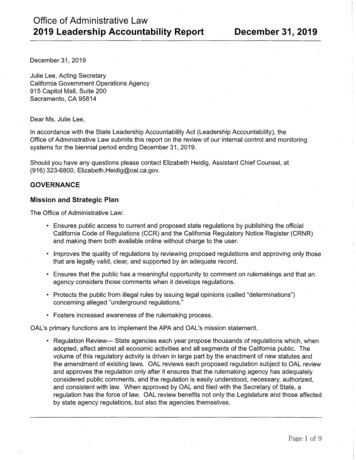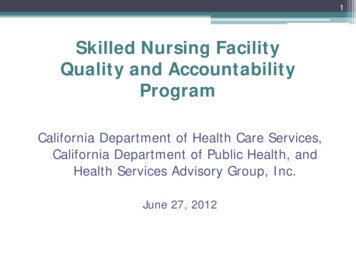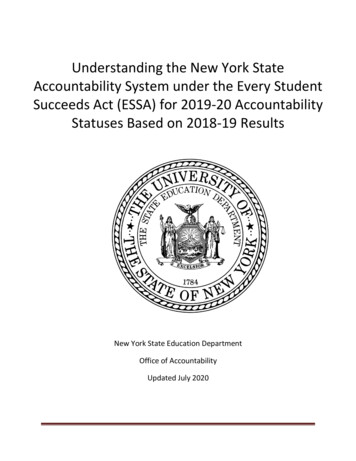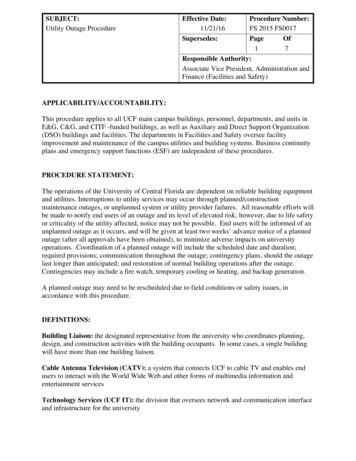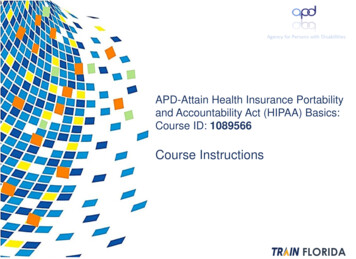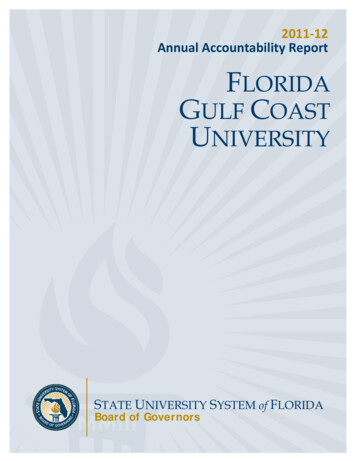
Transcription
2011‐12Annual Accountability ReportFLORIDAGULF COASTUNIVERSITYSTATE UNIVERSITY SYSTEM of FLORIDABoard of Governors
Annual Accountability Report2011-2012FLORIDA GULF COAST UNIVERSITYTABLE OF CONTENTSEXECUTIVE SUMMARYp. 2p. 4p. 5DASHBOARDKEY ACHIEVEMENTSNARRATIVEDATA TABLESSECTIONSECTIONSECTIONSECTIONSECTIONSECTION1. FINANCIAL RESOURCES2. PERSONNEL3. ENROLLMENT4. UNDERGRADUATE EDUCATION5. GRADUATE EDUCATION6. RESEARCH & ECONOMIC DEVELOPMENT1p. 11p. 16p. 17p. 20p. 30p. 33
Annual Accountability Report2011-2012FLORIDA GULF COAST UNIVERSITYDashboardMain CampusSites and CampusesEnrollmentsDegree Programs Offered(As of Spr. uctional Program:Professions plus arts & sciences,some graduate r’s & Specialist’s47231GraduateInstructional Program:Postbaccalaureate with arts and sciences (otherdominant fields) (education dominant)Enrollment Profile:1UndergraduateProfile:Size and Setting:Very high undergraduateFull-time four-year, selective,higher transfer-inMedium four-year, primarily residentialTOTAL(Fall eGraduateUnclassifiedResearch DoctorateProfessional DoctorateCarnegie ClassificationFaculty(Fall 2011)FullTimePartTimeTOTAL394103842320232Tenured & TrackNon-TenureBasic:Master's Colleges and Universities(larger programs)CommunityEngagement:Curricular Engagement andOutreach and PartnershipsACCESS TO AND PRODUCTION OF DEGREESBachelor's Degrees2,000Graduate ,250Bachelor's Degrees by ING STATEWIDE PROFESSIONAL AND WORKFORCE NEEDS5002011-12 Bachelor's Degrees Awarded inSelect Areas of Strategic Emphasis40030010080401002084450Health Professions*16Education*48160Health Therapy*81%88%0% 20% 40% 60% 80% 100%Master'sEducation*2010-11 Certification/LicensureExams (1st-time) Pass RatesNursing60282200STEM2011-12 Graduate Degrees Awarded inSelect Areas of Strategic EmphasisState/National BenchmarkSTEMUniversity Pass RateNotes for Areas of Strategic Emphasis:* Health Professions and Education are targeted for the disciplines in critical need in those fields and do not represent all degrees within the discipline.Note on Exams: Based on 2008-2010 average due to small number of examinees.2
Annual Accountability Report2011-2012FLORIDA GULF COAST UNIVERSITYDashboardBUILDING WORLD-CLASS ACADEMIC PROGRAMS AND RESEARCH CAPACITYAcademic Research and Development ExpendituresMillions 20 17.1 15 7.3 10 11.8 10.3 5 0FEDERAL2006-07TOTAL2010-11RESOURCES, EFFICIENCIES, AND EFFECTIVENESSUndergraduate Retention and Graduation RatesStudent-to-Faculty Ratio30First-time in College - Six Year43%40%2006-2012*2002-20086% n 1,562257% n 80462%67%2008-2012*2004-200812% n 30954%62%2003-20080%20%221054% n 352DARK BARS represent Graduation Rates22155% n 58840%226% n 226Other Transfers - Five year2007-2012*1820AA Transfers - Four Year2060%80%0100%2007-08 2008-09 2009-10 2010-11 2011-12LIGHT BARS represent those Still Enrolled* Indicates most recent data are still preliminary rates.Appropriated Funding Per Actual US FTE 12,000 10,000 8,000 3,419 3,624 3,603 4,734 5,278 6,033 5,326 4,998 4,272 3,6612008-092009-102010-112011-122012-13Estimates 6,000 4,000 2,000 0STATETUITION3Note: Tuition is the appropriatedbudget authority, not the amountactually collected. This tuitiondata does not include noninstructional local fees. Stateincludes General Revenues,Lottery and Other Trust funds(i.e., Federal Stimulus for 200910 and 2010-11 only). StudentFTE are actual (not funded) andbased on the national definition.
Annual Accountability Report2011-2012FLORIDA GULF COAST UNIVERSITYKey AchievementsSTUDENT AWARDS/ACHIEVEMENTS1. Alumnus Shane Drake received the American Institute of CPAs’ 2010 Elijah Watt Sells Awardwhich went to the highest cumulative scores on all four sections of the computerized UniformCPA Examination that was taken during 2010. He shared the award with 19 others nationally whoachieved an identical store. 103,000 sat the exam in 2010.2. Pianist Priscila Navarro won the 20th Annual International Chopin Competition in Corpus Christi,Texas. She was the youngest contestant in the competition. As part of the prize, she will performat Carnegie Hall in March of 2013.3. FGCU swimmers Danielle Beaubrun and Karen Vilorio competed in the Summer Olympic Gamesin London.FACULTY AWARDS/ACHIEVEMENTS1. Dr. Michael McDonald was named a Fulbright Scholar to the Republic of Croatia to teach in theDepartment of Ethnology and Cultural Anthropology at the University of Zadar.2. Dr. Elizabeth Elliott, "O. L. David Counselor of Distinction ", Kappa Delta Pi - International HonorSociety in Education.3. Dr. Bradley Hobbs, President, Association of Private Enterprise Education.PROGRAM AWARDS/ACHIEVEMENTS1. The Resort and Hospitality Management program received initial accreditation from theAccreditation Commission for Programs in Hospitality Management.2. The College of Education received initial accreditation from the National Council for Accreditationof Teacher Education.3. FGCU received a 1M pledge for the future development of a music therapy program.RESEARCH AWARDS/ACHIEVEMENTS1. 4.9M to provide portable career training to spouses of military personnel. Department ofDefense/MedCerts LLC.2. 960,000 for teacher recruitment, retention and recognition activities. FLDOE.3. 631,300 for state personnel development. FLDOE.INSTITUTIONAL AWARDS/ACHIEVEMENTS1. Dr. Elaine Nicpon Marieb, an internationally known author and co-author of numerous collegescience textbooks used by thousands of institutions around the world, made a 5 millionleadership gift that will transform health professions education at FGCU.2. FGCU was one of only ten institutions nationally to earn a 2012 Second Nature ClimateLeadership award granted by Second Nature and the American College and UniversityPresidents’ Climate Commitment.3. FGCU moved into US News’ top 35 (34th) among public regional universities in the South afteronly 15 years of operation.4
Annual Accountability Report2011-2012FLORIDA GULF COAST UNIVERSITYNarrativeINTRODUCTIONMissionEstablished on the verge of the 21st century, Florida Gulf Coast University infuses the strengths of thetraditional public university with innovation and learning-centered spirit, its chief aim being to fulfill theacademic, cultural, social, and career expectations of its constituents.Outstanding faculty uphold challenging academic standards and balance research, scholarly activities,and service expectations with their central responsibilities of teaching and mentoring. Working together,faculty and staff of the University transform students’ lives and the Southwest Florida region.Florida Gulf Coast University continuously pursues academic excellence, practices and promotesenvironmental sustainability, embraces diversity, nurtures community partnerships, values publicservice, encourages civic responsibility, cultivates habits of lifelong learning, and keeps theadvancement of knowledge and pursuit of truth as noble ideals at the heart of the university’s purpose.VisionFlorida Gulf Coast University will achieve national prominence in undergraduate education withexpanding recognition for graduate programs.Other Contextual Introductory CommentsAs the only public comprehensive university in the Southwest Florida region and serving more than onemillion people, Florida Gulf Coast University (FGCU) has a Statutorily-created responsibility to meet theneeds of the region’s citizens. To do this, FGCU has focused on two objectives in its brief 16-yearhistory: development into a full university, and meeting the career aspirations of its students. Since itsopening in fall 1997, enrollment has more than quintupled and the number of degrees awarded annuallynow exceeds 2000 from just 49 in the University’s first year. Simply stated, FGCU continues to exhibitthe fastest growth rate in the State University System (SUS) and is still growing but at a more measuredrate than in the past.Recognizing its special obligation to Southwest Florida, the university has implemented during the pastdecade more than 80 undergraduate and graduate degree programs in fields essential to the region’seconomy, including: health professions, business, education, resort and hospitality management, thesciences, the arts, and engineering. The university’s progress cannot be easily marked by traditionalmeasures alone, but more significantly in the way it transforms the lives of its students and the region.Annual employment data compiled by the Florida Education and Training Placement InformationProgram (FETPIP) consistently place FGCU graduates among the SUS leaders in terms of Floridaemployment of its graduates. Through FGCU’s unique student service requirements, students annuallycontribute over 150,000 service-learning hours to non-profit organizations in the region, providingcritically needed support.5
Annual Accountability Report2011-2012FLORIDA GULF COAST UNIVERSITYACCESS TO AND PRODUCTION OF DEGREESAs the best means to ensure access and increase degree production, FGCU continues to respond tothis goal by exhibiting the highest rate of enrollment growth among the 12 institutions of the StateUniversity System. Indeed, the Chronicle of Higher Education recently reported that FGCU had thehighest enrollment growth rate among public universities in the US between 2000 and 2010. Studentenrollment this fall is 6% greater than it was in fall 2011. This fall, FGCU increased its First-Time-InCollege (FTIC) population by 8% above the fall 2011 level. Total minority enrollment also has grown atthe fastest rate within the system during the last decade. Minority enrollment now amounts to 28% of thetotal student population up from 18% of FGCU’s total enrollment in 2007, representing a 56% increasein the last 6 years.Just in the last five years alone the number of bachelor’s degrees awarded annually to minority studentshas increased by over 50% and the number awarded annually to Pell grant recipients has more thandoubled [See Table 4I]. Indeed, Pell grant degree recipients have increased their representation amongall degree earners by 14 percentage points since 2007-2008, the greatest rate of increase within theSUS.Second, FGCU has steadily added to its degree program inventory to provide more choice to FGCUstudents, and more support for needs of the region’s employers. From its inception when it offered 12undergraduate degree programs and 12 graduate degree programs, the number of undergraduateprograms has quadrupled to over 50 programs currently and the number of graduate degree programshas roughly tripled to well-over 30 programs. The list of programs includes the Doctor of PhysicalTherapy (DPT) and the Educational Specialist (EdS) degrees, which graduated their first classes inspring 2011, and, most recently, the Doctor of Education (EdD) which will award its first degrees in2013.Third, the percentage of full-time and part-time students persisting and earning bachelor’s degreeswithin six years of matriculation has grown by 8% (cf. 3% for the SUS as a whole) in the last five years(40% -07-08 vs 43%-2011-12, See Table 4D). Indeed, FGCU exhibits the highest rate of total degreeproduction growth within the SUS, rising in the last five years alone by 44% at the baccalaureate leveland 49% at the graduate level.The level of degree production within areas of strategic emphasis, as determined by the Board ofGovernors (BOG), has also increased significantly during the last five years rising 64% at thebaccalaureate level [See Table 4H) and 70% at the graduate level (See Table 5C].MEETING STATEWIDE PROFESSIONAL AND WORKFORCE NEEDSFGCU has focused on addressing statewide professional and workforce needs primarily through itsemphasis on professional programs. Roughly 60% of declared student majors (both undergraduate andgraduate) are among the university’s four professional colleges: Health Professions and Social Work,Business, Education, and Engineering.In its efforts to meet regional needs, FGCU offers a very successful and newly accredited resort andhospitality management program, NCATE-accredited education programs, an AACSB-Internationalaccredited college of business, ABET-accredited engineering programs, and accredited programs in6
Annual Accountability Report2011-2012FLORIDA GULF COAST UNIVERSITYnursing, clinical laboratory science, occupational therapy, physical therapy, athletic training, professionalgolf management, counseling, social work, and public administration.Given the relative youth of the institution, the success of the university cannot be simply gauged in termsof absolute numbers of degrees conferred or in graduation rates. Rather it is best revealed by thesuccess of our graduates. In the health professions, recent cumulative licensing exam pass rates in thefields of nursing, nurse anesthesia, nurse practitioner, acute care nurse practitioner, occupationaltherapy, physical therapy, and clinical laboratory science range from 90% to 100%. FGCU graduatesalso are very likely to be employed within Florida’s workforce following graduation. In this regard, FloridaEducation and Training Placement Information Program data clearly show FGCU graduates employedafter graduation at among the highest rates within the SUS and earning competitive wages, despite thedevastating impact of the recession upon the Southwest Florida region.BUILDING WORLD-CLASS ACADEMIC PROGRAMS AND RESEARCH CAPACITYIn addition to its existing list of specialized program accreditations, FGCU is pursuing in the currentacademic year specialized accreditation for its Bower School of Music.Most recently, a number of undergraduate academic programs were ranked in US News Best College2013 edition. These included at the undergraduate level The Whitaker College of Engineering whichreceived initial ABET accreditation in 2010, and the Lutgert College of Business. At the graduate level,FGCU’s Nurse Anesthesia program was ranked among the top 100 and the FGCU OccupationalTherapy program was ranked at 116. The graduate nursing program was also ranked. While the actualrankings are modest, they attest to the remarkable quality of the university during a decade ofphenomenal growth.As a comprehensive regional institution, FGCU does not attempt to match the research infrastructurethat characterizes most of the SUS research-intensive institutions. Consequently, the success enjoyedby FGCU in just over fifteen years is noteworthy. FGCU’s annual R&D expenditures (FY2011) amountedto roughly 46,000 per full-time faculty member, a 23% increase over the prior fiscal year [See Table 6A]while this same full-time faculty provides instruction for 76% [See Table 4L] of all student credit hours.FGCU’s sponsored research and grants are especially strong in the College of Education and theCollege of Arts and Sciences. Research strengths have emerged in the life sciences, particularlybiotechnology and environmental and marine sciences.In addition to ensuring quality through accreditation, FGCU has taken care to ensure that growth ofenrollment does not affect student experience. Despite its growth, FGCU has consistently kept its focuson student learning, keeping the percentage of total undergraduate student credit hours taught by fulltime instructional faculty consistently above 75% for each of the last five years [See Table 4L].MEETING COMMUNITY NEEDS AND FULFILLING UNIQUE INSTITUTIONAL RESPONSIBILITIESDuring the deep and prolonged recession affecting Southwest Florida, Florida Gulf Coast University hasprovided a lifeline to the region. In FY 2010 alone, FGCU’s overall expenditures accounted for 345million, 3,119 jobs created, and 144 million in labor income. The continuing growth of the studentbody, faculty and staff, at a time of incremental growth of the population at large, only underscores theimportance of the University to the local economy, as all these groups contribute not only to theeconomy but to the social fabric of the community as well.7
Annual Accountability Report2011-2012FLORIDA GULF COAST UNIVERSITYOf course one of the most critical aspects of FGCU is the advanced education it provides to regionalresidents enabling them to access professional careers vital to Southwest Florida’s further developmentand economic diversification. Degree production has soared in the last decade at the fastest rate amongthe twelve SUS institutions. Post-graduation employment data supplied by the Florida Education andTraining Placement and Information Program show that FGCU graduates are in demand and theirdegrees valued. More importantly, they stay in Florida following graduation and contribute in many waysto the state’s prosperity. FGCU’s plans for further program expansion continue to emphasize science,technology, engineering, mathematics, and health with no fewer than six of seven new programsplanned for the next several years falling into these categories.FGCU’s Small Business Development Center (SBDC) also makes a major annual contribution to theregion’s economic vitality. In 2011, SBDC activity resulted in the creation or retention of over 700 jobs, 7.3 million in sales growth, 3.3 million in capital acquired, and the establishment of 59 new businessesin the region.To better inform business leaders in the area, FGCU’s Regional Economic Research Institute (RERI) inpartnership with the Lee County Economic Development Office and the Horizon Council have launched aquarterly business climate survey that focuses on the current economic environment and future businessexpectations.Community EngagementAs part of its ethos, FGCU strives for extensive engagement with its community, largely accomplishedthrough service on the part of its students, faculty, and staff. Last year alone, FGCU studentscontributed over 150,000 service hours. Consequently, FGCU’s presence touches the lives of thousandsof area residents annually. The range of engagement includes the environment, health, legal services,victim advocacy, finance and accounting, technology, social services, adult care, the arts, andeducation. To date, FGCU students have contributed over 1,000,000 service hours to SouthwestFlorida. FGCU’s programs have been lauded many times and in the last few years include recognitionby the Carnegie Foundation, Florida Campus Compact, the Governor’s Commission on Volunteerismand Community Service and the Washington Center for Internships and Academic Seminars. Last year,FGCU received a 3 million gift from Janet G. Cohen to promote civic engagement and expand itsstudent leadership development programs.PROGRESS ON PRIMARY INSTITUTIONAL GOALS AND METRICS (as outlined in University WorkPlan)FGCU has included three key initiatives for the next three years that will drive improvement in academicquality, return on investment, and operational efficiency (reflected in its current strategic plan: 20102015) within its 2012-2013 BOG Work Plan:1) Academic Quality - academic excellence will continue as the principal institutional goal.Assessment and continuous improvement will be tools in the vanguard of FGCU’s furtherevolution into a fully comprehensive university. Regional accreditation, state licensure/nationalcertification, and Board of Governors (BOG) planning and accountability requirements will ensurethe integrity of our academic enterprise. Specialized accreditation will be sought, earned, andmaintained for all appropriate disciplines. Within the next year, FGCU will achieve accreditation of8
Annual Accountability Report2011-2012FLORIDA GULF COAST UNIVERSITYits College of Education, Bower School of Music, and School of Resort and Hospit
1 annual accountability report 2011-2012 florida gulf coast university table of contents executive summ
